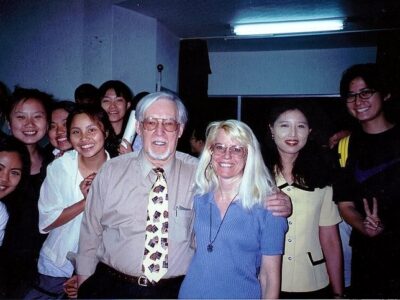
Editor’s note: This article first appeared at The American Spectator.
One figure that liberals didn’t commemorate this Black History Month is Eldridge Cleaver, the Black Panther Party ringleader of the 1960s. The reason is no great mystery: Had Cleaver remained a radical leftist, he no doubt would be remembered fondly by much of the Left today. But instead, leftists have gone silent on Cleaver, because of a very uncomfortable reality for them: by the 1980s, Eldridge Cleaver had become a conservative. He had become an intensely anti-communist, Reagan-endorsing Republican who even challenged his pro-Marxist congressman, Ron Dellums, in a run for Congress.
Yes, the legendary Eldridge Cleaver had become a black conservative. And there are few types that liberals dislike more than black conservatives.
Leroy Eldridge Cleaver was born in Wabbaseka, Arkansas on August 31, 1935. His father was a big, strong man who abused his mother, which terribly affected Cleaver. He longed to take vengeance upon his father, to grow up tough enough to “beat him to the ground the way he beat my mother.” And yet, Eldridge himself would become an abuser of women, and more.
Cleaver’s family moved to the turbulent Watts section of Los Angeles, a powder keg of racial discontent in the 1960s. Cleaver got sucked in. As a teen, he got into serious trouble. For various crimes, he landed first in juvenile detention centers en route to adult jail at Soledad State Prison. It was there that Cleaver might have been reformed; instead, he started reading Voltaire, Lenin, W.E.B. DuBois, and Karl Marx. Bad choices.
At age 23, out of Soledad prison, Cleaver quickly fell back into trouble. He was convicted of rape and assault with intent to murder, which sent him right back to jail. Making things worse, he was further politically radicalized by digging deeper into Marx’s Communist Manifesto.
During his time in Folsom State Prison in 1965, Cleaver wrote what became his famous memoir, Soul on Ice, published in 1968. He there candidly admitted his drug use, his raping of women, and his commitment to Marxism. The raping of women was especially appalling, as Cleaver cast it in a political-racial perspective as a form of “insurrectionist” activity against the dominant white power structure. He wrote horribly and disturbingly:
I became a rapist. To refine my technique and modus operandi, I started out by practicing on black girls in … the black ghetto where dark and vicious deeds appear not as aberrations or deviations from the norm, but as part of the sufficiency of the Evil of the day—and when I considered myself smooth enough, I crossed the tracks and sought out white prey…. Rape was an insurrectionary act. It delighted me that I was defying and trampling upon the white man’s law, upon his system of values, and that I was defiling his women.
As if that wasn’t awful enough, Cleaver had been willing to commit murder. He said openly that “there was little doubt” that he “would have slit some white throats” if he knew he could get away with it.
Soul on Ice, despite its violent depravity, became a bestseller and a sacred text to the Black Power movement. The ‘60s New Left embraced Cleaver wholeheartedly. It “dug” Cleaver’s revolutionary Marxism.
Cleaver joined the Marxist-Leninist Black Panther Party, located in Oakland, California. He became the group’s so-called “Minister of Information,” or spokesman. Like Third World Marxist revolutionaries, Cleaver and his Panthers were committed to armed struggle. They favored an armed overthrow of the U.S. government. In a fascinating 1986 interview with Reason Magazine, when he was no longer seeking to overthrow the U.S. government, and a very different person, Cleaver admitted that FBI Director J. Edgar Hoover had him and the Black Panther Party pegged, even as Cleaver’s white-leftist allies insisted that Hoover and his boys were paranoid anti-communists:
Sure I can understand J. Edgar Hoover, because he wasn’t inaccurate. We were the most militant black organization, and we were serious in what we were going about. He said that we were the main threat. We were trying to be the main threat. We were trying to be the vanguard organization. J. Edgar Hoover was an adversary, but he had good information. We were plugged into all of the revolutionary groups in America, plus those abroad. We were working hand-in-hand with communist parties here and around the world, and he knew that. So from his position, he had to try to stop us.
Cleaver explained how he and his comrades would plan ambushes of the so-called “pigs.” When the police responded, Cleaver and comrades tried to blame the cops:
We used to lie about it, because the information was a weapon also. We would go out and ambush cops, but if we got caught we would blame it on them and claim innocence. I did that personally in the case I was involved in…. We always did that.
The cauldron of this cesspool of violence was the state of California, where, interestingly, the governor was Ronald Reagan. This eventually pitted Eldridge Cleaver against Ronald Reagan. That was not a safe situation for Reagan.
Though Cleaver had been charged with attempted murder and ordered back to jail, a liberal judge released him after only two months. And no one was shocked when Free Speech Movement leftists at Cal-Berkeley in 1968 rolled out the red carpet for Cleaver to give a series of “lectures.” Governor Reagan and the California Board of Regents, however, were appalled. Reagan strenuously objected: “If Eldridge Cleaver is allowed to teach our children, they may come home one night and slit our throats.”
Reagan’s vivid warning was not unwarranted, given that Cleaver had written in Soul on Ice about desiring to slice throats. Cleaver not only expressed feigned outrage at Reagan’s remark but responded with violent warnings, several times challenging Reagan to a duel, publicly declaring, “I’ll beat him to death.” Likewise a target of Cleaver was California’s Superintendent of Public Instruction Max Rafferty. Cleaver ripped into both Reagan and Rafferty in a speech before a large audience of admiring leftists in the football stadium of Sacramento State College on October 2, 1968. To wild applause from “peace activists,” Cleaver barked:
Someone told me that when Ronald Reagan entered the capitol here, they changed the name of the Capitol [building] to the Fairy Building. I say that is very appropriate and want to congratulate whoever came up with that thought and I have a special new word for Ronald Reagan this morning, “[Expletive] you, Ronnie baby!” [loud, sustained, raucous applause]
I believe, I believe that Ronald Reagan is a punk, a sissy, and a coward, and I challenge him to a duel. I challenge the punk to a duel to the death that he can choose his own weapons. It could be a baseball bat, a gun, a knife, or marshmallow. I’ll beat him to death with a marshmallow.
You know, I lived in this area for a number of years—Folsom Prison is about 20 miles from here…. I know that my parole officer has his comrades here today, agents here. Same thing for Ronald Reagan, same thing for the adult authorities, the same things for all the wards involved in prison, all the pigs, the hogs who patrol the prison—[expletive] you!
As Cleaver raged on, the liberals loved it, cheering wildly in roaring approval. He referred to public authorities as pigs, racists, and “motherf**kers,” emphasizing that “the term ‘motherf**ker’ is a legitimate term.” He ripped the “bald headed faggots in the legislature,” and on and on.
Readers today will observe that Cleaver’s litany of insults ought to be denounced as “homophobic” by liberals. But quite the contrary: leftists exhibit an extraordinary ability to excuse gay-bashers when one of their guys is doing the bashing. For decades, they smeared J. Edgar Hoover as a “queer,” homosexual, cross-dressing “transvestite.” During this talk in Sacramento, the progressives in the audience chuckled merrily at every slur dished by Cleaver. He was energized by their reaction, carrying on like a vulgar comedian.
The good news: Eldridge Cleaver’s parole was revoked. It was clear this was a dangerous man. He was ordered back to prison. The bad news: He had other plans. He was not about to go back to jail.
Discovering Dystopia
On November 24, 1968, only three days before he was required to turn himself over to authorities, Eldridge Cleaver bolted. He fled America as a fugitive, settling first in Fidel Castro’s Cuba. The Cuban despot, however, was suspicious. He thought that perhaps Cleaver was secretly spying for the U.S. government—a most unlikely possibility, but not an unusual thought for the paranoid tyrant in Havana.
Of all places, Cleaver found refuge in another communist dystopia: Kim Il Sung’s North Korea. For a black man struggling for freedom from government oppression, this seemed an odd choice. Not only did North Korea have no freedom, but it also had no black people. And really, everyone in North Korea was in shackles, other than Kim and his party apparatchiks; here was a whole nation of slaves. That was something that Eldridge Cleaver learned right away. In Pyongyang, he was smacked upside the head with some harsh realities. The political pilgrim experienced a huge wake-up call. Cleaver was aghast at the reality on the ground in these communist hellholes. Marxism was not what he imagined it to be.
Cleaver learned that fellow leftist intellectuals in the United States glowed about these places without having actually visited them. If they did bother to visit, they received orchestrated tours where guides paraded them through Potemkin villages. But Cleaver was street-smart. He was no fool. He later told Reason Magazine: “See, I lived in those kinds of places and I got to know people.” Cleaver got those Potemkin village tours, but then, “I had a chance to meet other people and have a different experience. If I had gone only on the basis of how the governments treated me, I would have continued praising them, because really they did treat me well. They gave me a red-carpet treatment in those countries. But when you get off the red carpet and step down in the mud where the people are, you get a chance to talk to them and hear the stories that they have to tell, over and over again.”
Cleaver was given the useful-idiot treatment, but he was no useful idiot.
He later conceded that “to go to a country like Cuba or Algeria or the Soviet Union and see the nature of control that those state apparatuses had over the people—it was shocking to me. I didn’t want to believe it, because it meant that the politics that I was espousing was wrong and was leading toward a very bad situation.” He furthered: “when you look at those governments up close and see how they treat their own people, you can’t believe in that.”
Cleaver got out of Pyongyang and put it and other false utopias far behind. By 1975, he was longing to make his way back to America, the country that he once thought was the world’s most oppressive. His real-world experience with communism had made Cleaver a committed anti-communist. He started questioning everything that he had learned from the Left.
In choosing to return to America, Cleaver would need to face the justice system yet again. But now, he was willing to do so. As one observer noted, “Facing a murder charge in the United States is, apparently, preferable, and not by a small margin, to being given the red-carpet treatment in the various socialist and communist paradises around the world.” And so, in 1977, Eldridge Cleaver surrendered to the FBI. Somehow, through a plea bargain, he was sentenced to merely 1,200 hours of community service. He must have been grateful for this leniency. In Cuba or North Korea, he would have been cast into a dungeon. In the USSR, Siberia.
For Cleaver, these real-life experiences began a religious odyssey as well. Like Malcolm X and Muhammad Ali, he had once sought Islam. Now, he turned to Christianity. He became a born-again evangelical before eventually settling on Mormonism, joining the Church of Jesus Christ of Latter-day Saints in December 1983.
Backing Reagan and Running for Congress
Eldridge Cleaver’s dramatic conversion soon became public when he announced that he was backing President Ronald Reagan’s 1984 reelection. He informed a shocked America that he had become a conservative Republican and would even seek political office on the GOP ticket. He ran for Congress against Rep. Ron Dellums, the wildly pro-communist Democrat congressman from Berkeley.
Cleaver had once so militantly opposed Ronald Reagan that he had been willing to kill him. By the 1980s, he supported Reagan and his policies on issues from anti-communism to strengthening law and order. Cleaver came to see welfare programs as actually hurting the people they were intended to help. He told Reason Magazine in 1986:
My life, I think, spans the whole era of the welfare state. I was born in 1935. I remember when people were ashamed to be on welfare and receive state aid and all that, but we developed a situation where black people to a large degree and a lot of other groups such as elderly people, children and a lot of poor white people ended being harnessed by political forces, particularly the Democratic Party. In return for the federal appropriations that we are now dependent upon, our leaders were obligated to get out the black vote for the Democratic Party. So this put us in a negative relationship with the economic system. We were dependent upon the federal budget—a very precarious situation.
Black conservatives like Walter Williams and Clarence Thomas would refer to this “harnessed” political dependency as the Democratic Party’s “liberal plantation.” When they pointed this out, black and white liberals excoriated them as “Uncle Toms.” Nonetheless, black conservatives like Williams, Thomas, Bob Woodson, Thomas Sowell, Larry Elder, Candace Owens, Ben Carson and on and on have made this point, enraging liberal Democrats. Eldridge Cleaver, a symbol of black empowerment, wanted blacks to empower themselves.
By this point, Cleaver was not only firmly anti-welfare state, but had become firmly pro-American, ditching all the anti-American Marxist claptrap he had once advocated. When the reporters from Reason Magazine visited Cleaver at his home in Berkeley in 1986, they were struck by the large American flag flying from his front porch. Cleaver went so far as to demand that the berserk Berkeley City Council begin its meetings with the Pledge of Allegiance. This prompted the far-left Berkeley Mayor Gus Newport to snap at Cleaver: “Shut up, Eldridge. Shut up or we’ll have you removed!”
So much for the Berkeley Free Speech Movement. But as Cleaver came to understand, the Left was full of hypocrisy. Leftists ran not only the “liberal plantation,” as he called it, but cancel culture.
Cleaver was very outspoken during this period. He talked about other former Black Panthers who had become conservatives—as well as staunch supporters of the police. He spoke of one incident: “I was pulled over in my car with my secretary for a traffic thing, and one of the officers walked up to the car and saw me sitting inside. He took off his hat and said, ‘Hey, Eldridge, remember me?’ He used to be a Panther.”
Eldridge Cleaver would today be appalled at the reckless, dangerous calls by groups like Black Lives Matter to defund and even abolish the police, not to mention the support of communism by BLM’s founders Patrisse Cullors and Alicia Garza.
A Soul on Ice Seeks Heaven
In all, to say that Eldridge Cleaver lived a difficult life is an understatement. He had been a violent criminal in his youth. Throughout the remainder of his life, he spoke candidly about his many terrible sins and crimes. By the 1980s, he had turned his life around. Still, he struggled. Despite seeking out Christianity, he remained long tormented by his demons. He never gave up drug use completely. He went into a rehab center. In 1994, he almost died from a blow to the head by a fellow drug addict.
Still, his long struggle brought him closer to peace and contentment. Richard Rose, a professor of religion and philosophy who worked with Cleaver at the University of La Verne (near Los Angeles), watched him up close in his final days. “He was a gentle spirit,” Rose observed. “His presence of nonconformity was still there, and he was his own person.”
The lifetime of turmoil took a toll. Cleaver struggled physically, but his belief in a higher power, a Creator, kept him going. At one of his final public appearances, an Earth Day conference in Portland, Oregon, in late April 1998, he affirmed, “I’ve gone beyond civil rights and human rights to creation rights.”
It was above all his Creator that he longed for.
On May 1, 1998, at 6:20 a.m., Eldridge Cleaver died at Pomona Valley Hospital Medical Center in suburban Los Angeles. He was 62 years old.
Eldridge Cleaver’s long fight was over. The soul on ice endeavored for his soul to enter heaven. That meant leaving the Left far behind. He and his remarkable journey deserve to be remembered. But unfortunately, our liberal media, historians, and culture do not fondly remember black conservatives like Eldridge Cleaver, not during Black History Month or at any time.





Excellent and interesting article on Eldridge Cleaver. It’s interesting how somethings never change from ancient times to present day.If you don’t have virtue in society it’s hard to have freedom and what better way to have virtue in society than through Christianity . Keep up the great work.
A very interesting and enlightening article. Until now, I only knew of Eldridge Cleaver as an extremely radical leftist of the 60’s/70’s. Somehow, I missed his conversion to conservatism and Christianity. I suspect more would know if our media were more balanced.
A remarkable man, but if he pursued Christianity and settled on Mormonism, I’m afraid he didn’t arrive.
Paul,
That is an incredible story and very well written.
You described a life of grevience, justification, longing, and regret turn to confession, faith, hope, and love.
The valuable work Center for Vision & Values continues through the Institute for Faith and Freedom. You bring relevant and profound perspectives to the Public Square. It’s appreciated.
Sincerely,
Ray